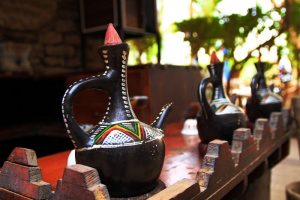Unlike the rest of the world, Ethiopia rings in its New Year, Enkutatash, on September 11, and not on January 1. This is because their unique calendar considers September, called Meskerem in Amharic, to be the first month of the year. Here is a look at the history behind this unique New Year timing and celebration.
The History of Enkutatash
 The Ethiopian calendar is based on the Egyptian and Julian calendars, which were brought to Ethiopia by missionaries. The Ethiopian year consists of 12 months of 30 days, plus a thirteenth month (Pagume) of five or six timekeeping days. This means that Ethiopians are currently seven years and eight months behind the Gregorian calendar used in most of the world.
The Ethiopian calendar is based on the Egyptian and Julian calendars, which were brought to Ethiopia by missionaries. The Ethiopian year consists of 12 months of 30 days, plus a thirteenth month (Pagume) of five or six timekeeping days. This means that Ethiopians are currently seven years and eight months behind the Gregorian calendar used in most of the world.
Enkutatash means the ‘gift of jewels’. According to legend, the Queen of Sheba returned from her famous visit King Solomon of Jerusalem some 3,000 years ago, with jewels gifted by her host. Her return to Ethiopia after receiving this gift coincided with the New Year celebration in September, and hence the name Enkutatash came to be.
It is also said that the holiday is based on the Ethiopian calendar, which was fixed to the Julian calendar in 25 BC by Roman Emperor Augustus. The date marks the approximate end of the rainy season and Ethiopians believe that the month of September has different signs explaining why it should be celebrated as the start of a New Year. It is a time for blooming flowers, sunny days and generally pleasant weather, as well as allowing the people to people leave the rainy, foggy and thunderous months behind and move on to better days.
Celebrating the Ethiopian New Year
 Once every September, the numbers of daylight hours and nighttime hours happen to be exactly equal across the world, which is another reason Ethiopians celebrate New Year during this month. During this time of the year, the Sun and the Moon that are used to count time on the Ethiopian solar calendar each have 12 hours before setting on.
Once every September, the numbers of daylight hours and nighttime hours happen to be exactly equal across the world, which is another reason Ethiopians celebrate New Year during this month. During this time of the year, the Sun and the Moon that are used to count time on the Ethiopian solar calendar each have 12 hours before setting on.
One of the most fascinating practices of the New Year is when groups of young Ethiopian girls go around performing a song called ‘Abebayehosh.’ You could be at home watching TV or just out for a leisure stroll when the girls approach serenading you with song and some pretty good drumming. They carry bright-yellow flowers, which grow in Ethiopia only from September to November. As a token of appreciation, people usually respond with money or bread prepared for the holidays. Expect to receive heartwarming praises from the kids, wishing you more riches and good fortune for the coming year. It’s all good fun.
The Ethiopian New year is a celebration involving the entire family. While the girls are out singing and clapping their hearts out, the boys are making beautiful paintings that herald the coming of a bright new day, which they then go from house to house handing out their works of art on the morning of the holiday to relatives, neighbors, and friends.
Week-Long PARTY
 Celebrations for the Ethiopian New Year are usually focused on family events and tend to last a week or more. The holiday starts on New Year‘s Eve when each household comes together to light wooden torches, which symbolize the coming of the new season of sunshine after the end of the rainy season. They also light bonfires in their backyards, dancing around in circles and simply having a jolly good time as a family.
Celebrations for the Ethiopian New Year are usually focused on family events and tend to last a week or more. The holiday starts on New Year‘s Eve when each household comes together to light wooden torches, which symbolize the coming of the new season of sunshine after the end of the rainy season. They also light bonfires in their backyards, dancing around in circles and simply having a jolly good time as a family.
The feasts are magnificent and there is so much to eat and drink all the way. One of their most popular dishes, known as Doro wot (chicken stew), is the highlight of the holiday menu. This dish takes at least half a day to prepare, is served with injera (a flatbread) and washed down with local alcoholic drinks. Usually, everyone dines together, and sometimes you’ll even see people feeding each other as a way of showing affection and love.
If you’re looking to try out the world-famous Ethiopian coffee in all its glory, then there’s no better time than this holiday. Served with popcorn and complimented by a pleasant frankincense aroma, this coffee is rich yet simple and definitely a must-try during your stay in Ethiopia. Plus, this festive period means everyone is in a cheerful mood, which only makes for more pleasant conversations around the coffee table.
The Ethiopian New Year is one of the best times to experience the ancient and glorious country of Ethiopia. So from all of us here, we wish you Enkuan Aderesachihu! (Happy New Year)!

